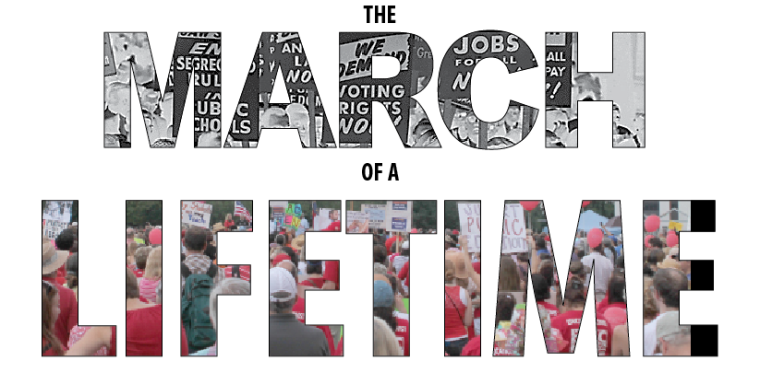
Martin Luther King Jr. laid his vision out to America exactly 50 years ago at the March on Washington for Jobs and Freedom. It was the first time in history that approximately 250,000 Americans from civil rights, labor and religious organizations had gathered together in one place.
The march is widely credited as a major catalyst in passing the Civil Rights Act of 1965 and the Voting Rights Act of 1965, but the march’s themes of jobs, freedom and economic liberty for people of all colors and classes is often overlooked.
Fifty years ago, Bayard Rustin, an organizer of the March, read off a list of 10 demands concerning social, political and economic issues compiled by the leaders of the Civil Rights Movement. Today, much of what was demanded in that manifesto has bled into North Carolina’s 21st century political climate.
Although many people today remember the event solely in the context of civil rights for black Americans, the March placed labor laws front and center, featuring speakers like A. Phillip Randolph, a leader of the American Labor Movement who spoke prior to King that day.
David Zonderman, a professor of history at N.C. State and an expert on labor history, said although the labor force has grown in the United States, labor laws have barely changed at all since the 1960s.
“Since the 1960s, it has become much harder to organize unions,” Zonderman said. “That’s not because the laws officially changed, but because companies have gone to the edge of breaking laws, if not actually breaking laws, but the penalties are so low there’s no real great harm in breaking those laws.”
Instead, in so-called “right-to-work” states like North Carolina, state laws are so stringent that forming a union for any group of working people is difficult if not impossible, Zonderman said.
Right-to-work laws allow the government to regulate contractual agreements between employers and labor unions to prevent those agreements from excluding non-union workers or requiring employees to pay dues to unions that negotiated their labor contract, which greatly weakens the union.
“People will say it’s for economic freedom and for no forced unionization,” Zonderman said. “The end result is it’s kind of a poison pill. It’s a way for the state of North Carolina to say ‘We don’t want you here, and if you come here, we’ll make it really, really hard for you to operate, and you’ll lose money in the deal.’”
Zonderman said the increase in inequality related to labor laws has much to do with the tax policies enacted by state and federal governments for the past 30 years.
“There’s no doubt the gap between wealthier and poor people has grown since the 1980s,” Zonderman said. “If you look at this country from the ‘30s to the ‘70s, the gap actually narrowed. Starting in the ‘80s, it’s widened again, and we’re back really where we were in the 1920s, if not the Gilded Age of the 1880s.”
“That’s due less to the labor law than to tax policy,” Zonderman said. “People have always complained about our taxes being high, but compared to where they were 50 years ago, the taxes on wealthy people are excessively low.”
After one of the most controversial sessions in the history of the North Carolina General Assembly, history professor Katherine Mellon Charron said much of what the Civil Rights activists of the 1960s fought for has been rolled back in a single six-month session.
“We had a call for voting rights in 1963,” Charron said. “Now voting rights is an issue in North Carolina. We had a call for a minimum wage in 1963. We have a call for nationally raising the minimum wage now. We had a call for integrated schools in 1963; our schools have become more segregated. We had a call for decent housing in 1963; we still need decent housing in North Carolina. Hunger in North Carolina has gone up 56 percent. We don’t only need decent housing, we need food security. You can’t say that things haven’t changed, because they have changed. However the struggles for security, quality and justice have been rolled back in 2013 in North Carolina.”
Charron took particular issue with the new Voter ID passed by the legislature in the last session.
“Voter ID is one thing, but a 67-page bill that introduces the most repressive voter suppression legislation in the country is not just about voter fraud,” Charron said. “You’re more likely to have voter fraud in absentee ballots, but they didn’t touch that. Instead they went after students, the elderly, people in rural areas, the poor, and African-Americans and other people of color.”
Zonderman also compared the peaceful protest movements of the 1960s to the recent ‘Moral Mondays’ protests in response to much of the legislation passed by the General Assembly and signed into law by Gov. Pat McCrory.
“Some of the techniques and ideas are linked, [particularly] the idea of publicly protesting against what people feel are injustices,” said Zonderman. “Some of the sit-ins are similar to those conducted in the ‘60s.”
Like King, the Rev. William J. Barber, president of the North Carolina NAACP leader of the ‘Moral Monday’ movement, has been able to use elements of religion to promote social justice.
Zonderman said that while it is important to remember the March on Washington as a civil rights landmark in terms of race relations, it was also very much aimed at combating economic inequality in general.
“We remember it today as civil rights and Dr. King’s ‘I have a Dream,’ but it’s like reading one page out of an entire book,” Zonderman said. “If you read the whole book on the March on Washington, Dr. King didn’t just say ‘I have a dream,’ there was a lot more to his speech.There were a lot of other speakers besides Dr. King. He was the final [speaker], but before there were many. The march was about freedom and jobs and economics as well as civil rights.”